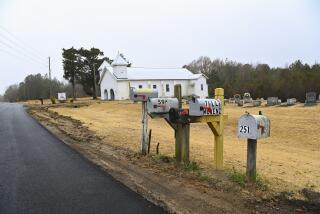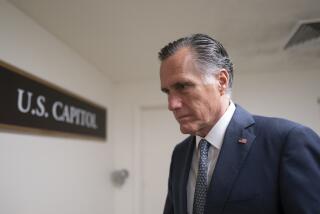The plot thickens for legendary bookstore
Amid the blues bars and rescue missions of Pioneer Square, Seattle’s storied intersection of sports and booze, art and vagrancy, the Elliott Bay Book Co. has stood as a symbol of comfortable, old-world erudition.
For years, it has been one of the West’s few destination bookstores, a place tourists and locals alike visit for the sake of spending a couple of hours getting lost in its 140,000-some neatly stacked titles. When the last actual book downloads onto Kindle (at Amazon.com on the other side of town), Elliott Bay, one feels sure, will still be selling its musty, hard-bound predecessors, perused with a tangy cup of espresso in the basement cafe.
So it is with no small degree of anguish that Seattle has reacted to the news that Elliott Bay is facing the likely choice of either moving across town or closing altogether when its lease is up Jan. 31.
In some ways it is the familiar story of an independent bookstore getting hammered by book chains, online retailers and big-store discounters. But there are peculiar Seattle wrinkles.
The city’s two downtown sports stadiums are bringing crowds of often-tipsy revelers through Pioneer Square, scaring the tourists and competing with locals for the ever-dwindling supply of parking.
And during last year’s holiday season, any shoppers who might have been willing to jack up their credit cards during the recession stayed home anyway when an unusually heavy snowstorm paralyzed the hilly downtown streets for days.
“It’s been a precarious existence the last four or five years,” said owner Peter Aaron, adding that the store was put in the position “where we just did not have the wherewithal to ride out any significant problems that came along, let alone the perfect storm that hit us last year.”
Aaron, a former retailer at Bullock’s in West Los Angeles, has appealed to 11 banks for loans to keep operating.
So far, the only light he sees is the prospect of moving out of downtown, possibly to Capitol Hill -- a funky, alternative neighborhood on the other side of the freeway near Seattle Central Community College and Seattle University. (As it turns out, another well-known independent bookstore in Capitol Hill is closing.)
Unlike Pioneer Square, whose full-time residents seem to be primarily those who sleep on the streets, Capitol Hill has lovely old residential neighborhoods and a thriving student population.
But would Elliott Bay be able to retain its signature old-world ambience and bookish atmosphere in a modern new space, far from the historic heart of the city?
Aaron says he has come to believe the store’s location is “the driving factor” behind the sales slump.
“Between the lack of parking, the adverse effect of sporting events . . . and the perception on the part of many people that this is not a desirable or safe area of the city to venture into, especially at night, it’s really been a huge inhibitor of our business,” he said.
Elliott Bay has always done more than sell books.
It has the most active reading program in the country, holding more than 500 readings a year in its intimate, book-filled gathering room downstairs.
Bill Clinton, Norman Mailer, Salman Rushdie, David Lynch and Richard Russo have all read and talked in the space that seems to invite lively, back-and-forth conversation.
The cozy, independently run cafe, also downstairs, is rumored to be the inspiration for Cafe Nervosa on the Seattle-based television series “Frasier.”
Upstairs, on the main floor, there is an entire wall of staff-recommended books, and the shelves throughout the store are flecked with handwritten cards from the store’s knowledgeable staff.
Thom Chambliss, executive director of the Pacific Northwest Booksellers Assn., said independent bookstores could survive competition from online retailers, but the killer blow is being struck by big-box retailers who are deeply discounting the easy-to-sell, big-name bestsellers that normally allow stores like Elliott Bay to also stock shelves with wild bird catalogs, biographies of obscure feminists, first novels of new regional authors, and treatises on the politics of climate change.
“It’s a problem for the country, not just the industry, if we don’t have stores capable of making a profit while stocking all the ‘backlist’ books,” he said.
“That will really hurt the cultural opportunities for this country. People’s access to ideas will be seriously compromised. And that discussion is not taking place in this country.”
The banks are expected to weigh in soon on Aaron’s appeal. Another hope, he said, would be to lure a local billionaire into buying the store as “a hobby.”
But what does that say about the future of book retailing? Aaron shrugs. It won’t be his problem anymore.
More to Read
Sign up for our Book Club newsletter
Get the latest news, events and more from the Los Angeles Times Book Club, and help us get L.A. reading and talking.
You may occasionally receive promotional content from the Los Angeles Times.






